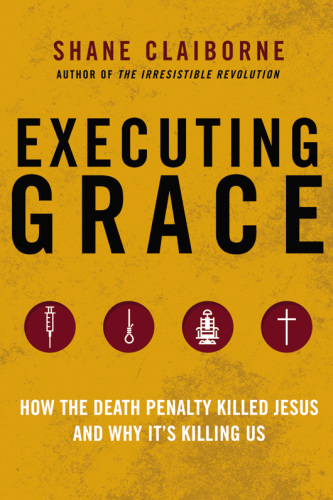
Executing Grace
Why It Is Time to Put the Death Penalty to Death
کتاب های مرتبط
- اطلاعات
- نقد و بررسی
- دیدگاه کاربران
نقد و بررسی

Starred review from May 23, 2016
George Junius-Stinney Jr. was so small "that his head didn't reach into the metal helmet of the electric chair." At age 14, Junius-Stinney was the youngest person ever executed in the United States. The guards brought the biggest book they could find for him to sit on: the Bible. With a characteristically engaging voice, Claiborne (The Irresistible Revolution) delves into how, as a white Southern evangelical Christian, he changed his mind about capital punishment. Through stories, interviews, history, and cogent scriptural reflection, Claiborne takes the reader on a moral journey that's often hard to undertake on one's own. He tests common beliefs, including the ideas that all murder victims favor the death penalty, prison officers feel justified in carrying out executions, and prisoners on death row have been fairly judged and are guilty of their crimes. He also looks at how the courts operate against victims who request that the death penalty not be applied in the prosecution of their loved one's killer, even denying them access to victim assistance funds. Claiborne's latest is a timely release as an increasing number of U.S. states move to more effective forms of justice and Pope Francis calls for a global moratorium on capital punishment.

May 15, 2016
Passionate Christian activist Claiborne (The Irresistible Revolution: Living as an Ordinary Radical, 2006, etc.) uses Scripture and societal statistics in an argument for the abolishment of the death penalty.The author begins by considering the victims of crime involved in death sentence cases. He notes that the death penalty is rarely satisfying to those left in the wake of tragic crimes; instead, it prolongs mental anguish for victims' families and places the emphasis on the criminal as opposed to the victim. After addressing the needs of victims, Claiborne explores faith issues surrounding the death penalty, arguing that the early Christian church was strictly against its use. The author points to the death of Jesus--"the most famous execution in history"--and notes the irony that his followers would ever support the executions of others. Turning to modern times, Claiborne acknowledges that the death penalty has been dwindling in use worldwide, and in the United States, for decades. He also points out that the U.S. ranks alongside such nations as Saudi Arabia and Iraq in its use of the death penalty, while most nations have banned it or diminished its use. Claiborne finds a tie between the modern use of execution and the history of illegal lynchings in the American South, arguing that the death penalty today continues to be a racially charged issue. After discussing botched executions, the innocent on death row, and the weight of the issue upon executioners themselves, the author offers an alternative viewpoint on how to bring about justice in such cases. Claiborne's arguments are well-structured and, perhaps necessarily, laced with pleas to emotion. Proponents of the death penalty (among others) may be put off by his localization of the issue as a problem inherent to the Southern states, specifically to Southern evangelicals. In this often moving and unsettling book, Claiborne provides a meaningful contribution to a deeply fraught topic.
COPYRIGHT(2016) Kirkus Reviews, ALL RIGHTS RESERVED.

























دیدگاه کاربران